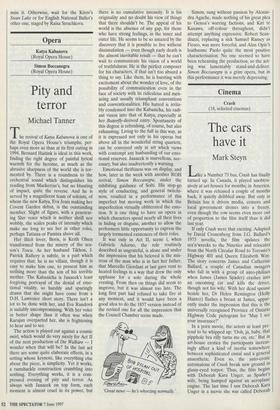Opera
Katya Kabanova (Royal Opera House) Simon Boccanegra (Royal Opera House)
Pity and terror
Michael Tanner
The revival of Katya Kabanova is one of the Royal Opera House's triumphs, per- haps even more so than at its first outing in 1994. Bernard Haitink is ideal in this work, finding the right degree of painful lyrical warmth for the heroine, as much as the abrasive sharpness of the world she is tor- mented by. There is a roundness to the orchestral sound which distinguishes his reading from Mackerras's, but no blunting of impact, quite the reverse. And he is served by a magnificent team of soloists, of whom the new Katya, Eva Jenis making her Covent Garden debut, is the outstanding member. Slight of figure, with a penetrat- ing Slav voice which is neither shrill nor wobbly, she scales peaks of intensity which make me long to see her in other roles, perhaps Tatiana or Pamina above all.
Her illicit lover, Boris, is Keith Olsen transformed from the misery of the sea- son's Tosca. As her husband Tikhon, J. Patrick Raftery is subtle, in a part which requires that; he is no villain, though it is easy to make him one, to present him as nothing more than the son of his terrible mother. The Kabanicha is Janacek's least forgiving portrayal of the denial of emo- tional vitality, so harshly and sparingly drawn that she might have come from a D.H. Lawrence short story. There isn't a lot to be done with her, and Eva Randova is suitably uncompromising. With her voice in better shape than it often was when Karajan overparted her, she is frightening to hear and to see.
The action is played out against a cosmic swirl, which would do very nicely for Act II of the next production of Die Walkiire — I wonder when that will be? In the last act there are some quite elaborate effects, in a setting whose keynote, like everything else about the piece, is simplicity. Yet it works, a ramshackle construction crumbling into nothing. Everything works, it is a com- pressed evening of pity and terror. As always with Janacek on top form, each moment is almost cruel in its power, but there is no cumulative intensity. It is his originality and no doubt his view of things that there shouldn't be. The appeal of his world is the absence of any gap, for those who have strong feelings, in the inner and outer life. He seems to be so amazed by the discovery that it is possible to live without dissimulation — even though early death is the almost inevitable result — that he can't wait to communicate his vision of a world of truthfulness. He is the perfect composer for his characters, if that isn't too absurd a thing to say. Like them, he is bursting with excitement about the wonder of love, of the possibility of communication even in the face of society with its ridiculous and men- acing and usually triumphant conventions and conventionalities. His hatred is irrita- bly condensed into the Kabanicha, his radi- ant vision into that of Katya, especially at her Butterfly-derived entry. Spontaneity of this degree is refreshing, of course, but also exhausting. Living to the full in this way, as it is expressed not only in his operas but above all in the wonderful string quartets, can be conveyed only in art which views with contempt any husbanding of our emo- tional reserves. Janacek is marvellous, nec- essary, but also inadvertently a warning.
Emotional thriftiness was on display, and how, later in the week with another ROH revival, Simon Boccanegra, under the inhibiting guidance of Solti. His stop-go style of conducting, and general twitchi- ness, resulted in a performance of this imperfect but moving work in which the imperfection virtually obliterated the emo- tion. It is one thing to have an opera in which characters spend nearly all their lives in hiding or disguise, another to allow the performers little opportunity to express the largely tormented existences of their roles.
It was only in Act II, scene i, when Gabriele Adorno, the role routinely described as ungrateful, is alone and under the impression that his beloved is the mis- tress of the man who is in fact her father, that Marcell° Giordani at last gave vent to heated feelings in a way that drew the only applause for a solo during the whole evening. From then on things did seem to improve, but it was almost too late. The long first part had refused to take fire at any moment, and it would have been a good idea to do the 1857 version instead of the revised one for all the impression that the Council Chamber scene made.
'Great news — he wheezing normally.' Simon, sung without passion by Alexan- dru Agache, made nothing of his great plea to Genoa's warring factions, and Kin i te ICanawa, off-colour throughout, didn't attempt anything expressive. Robert Scan- diuzzi, replacing a sick Samuel Ramey as Fiesco, was more forceful, and Alan Opie's loathsome Paolo quite the most positive characterisation. No one seemed to have been rehearsing the production, so the act- ing was lamentably stand-and-deliver. Simon Boccanegra is a grim opera, but in this performance it was merely depressing.










































































 Previous page
Previous page